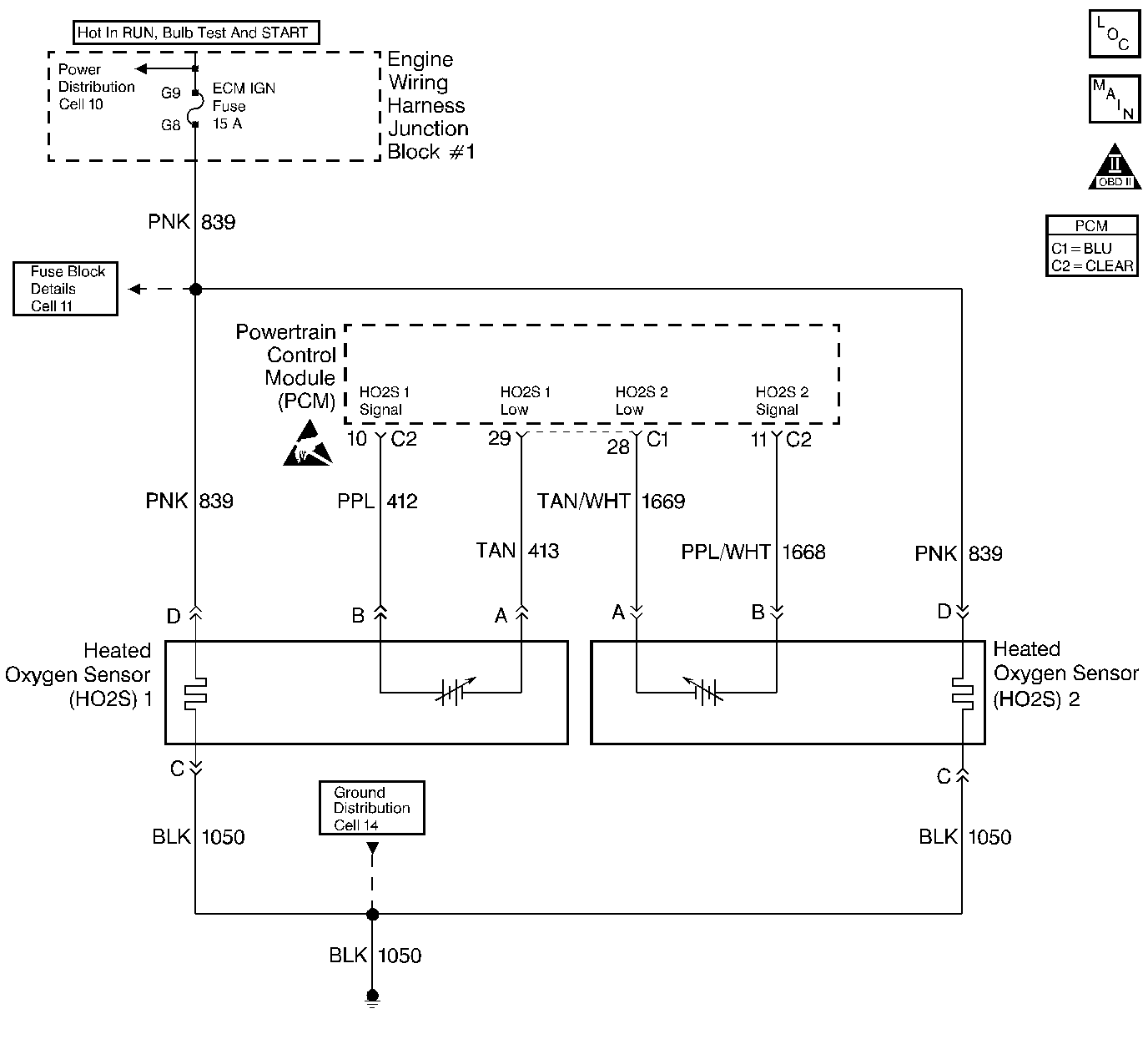
Circuit Description
To control emissions of Hydrocarbons (HC), Carbon Monoxide (CO), and Oxides of Nitrogen (NOx), a three way catalytic converter is used. The catalyst within the converter promotes a chemical reaction which oxidizes the HC and CO present in the exhaust gas, converting them into harmless water vapor and carbon dioxide. The catalyst also reduces NOx, converting it to nitrogen. The PCM has the ability to monitor this process using the HO2S 1 and the HO2S 2 heated oxygen sensors. The HO2S 1 sensor produces an output signal which indicates the amount of oxygen present in the exhaust gas entering the three way catalytic converter. The HO2S 2 sensor produces an output signal which indicates the oxygen storage capacity of the catalyst this in turn indicates the catalysts ability to convert exhaust gases efficiently. If the catalyst is operating efficiently, the HO2S 1 signal will be far more active than that produced by the HO2S 2 sensor. If the HO2S 2 signal voltage remains at or near the 450 mV bias for an extended period of time, DTC P0140 will be set.
Conditions for Running the DTC
| • | No active TP, MAP, MAF, IAT, ECT, or CKP sensor, misfire, fuel injector circuit, EVAP, Fuel trim, EGR, DTCs present. |
| • | Engine coolant temperature greater than 65°C (149°F). |
| • | Engine run time longer than 200 seconds. |
Conditions for Setting the DTC
HO2S 2 signal voltage remains between 425 mV and 475 mV for more than 140 seconds.
Action Taken When the DTC Sets
| • | The PCM will illuminate the malfunction indicator lamp (MIL) during the second consecutive trip in which the diagnostic test has been run and failed. |
| • | The PCM will store conditions which were present when the DTC set as Freeze Frame and Failure Records data. |
Conditions for Clearing the MIL/DTC
| • | The PCM will turn OFF the MIL during the third consecutive trip in which the diagnostic has been run and passed. |
| • | The History DTC will clear after 40 consecutive warm-up cycles have occurred without a malfunction. |
| • | The DTC can be cleared by using the scan tool. |
Diagnostic Aids
Check for the following conditions:
| • | Corroded exhaust flange bolts. Using a digital multimeter, ensure that continuity exists between the engine block and the heated oxygen sensor shell. If resistance is excessively high, replace corroded exhaust flange attaching hardware as necessary. Refer to Exhaust System Description . |
| • | Poor connection or damaged harness. Inspect the harness connectors for backed out terminals, improper mating, broken locks, improperly formed or damaged terminals, poor terminal to wire connection, and damaged harness. Refer to Intermittents and Poor Connections Diagnosis , Repairing Connector Terminals and Connector Repairs in Wiring Systems. |
| • | Malfunctioning HO2S heater or heater circuit. With the ignition ON, engine not running the HO2S voltage displayed on a scan tool should gradually drop to below 250 mV or rise to above 600 mV. If not, disconnect the HO2S and connect a test light between the HO2S ignition feed and heater ground circuits. If the test light does not light, repair the open ignition feed or sensor ground circuit as necessary. If the test light lights and the HO2S signal and low circuits are OK, replace the affected HO2S. Refer to Heated Oxygen Sensor Replacement . |
| • | Intermittent test. With the ignition ON, monitor the HO2S signal voltage while moving the wiring harness and related connectors. If the malfunction is induced, the HO2S signal voltage will change. This may help isolate the location of the malfunction. Refer to Intermittents and Poor Connections Diagnosis in Wiring Systems. |
Test Description
Number(s) below refer to the step number(s) on the Diagnostic Table:
-
If the DTC P0140 test passes while the Fail Records conditions are being duplicated, an intermittent condition is indicated.
Reviewing the Fail Records vehicle mileage since the diagnostic test last failed may help determine how often the condition that caused the DTC to be set occurs. This may assist in diagnosing the condition.
-
This vehicle is equipped with a PCM which utilizes an Electrically Erasable Programmable Read Only Memory (EEPROM). When the PCM is being replaced, the new PCM must be programmed. Refer to Powertrain Control Module Replacement/Programming .
Step | Action | Value(s) | Yes | No |
|---|---|---|---|---|
1 | Was the Powertrain On Board Diagnostic (OBD) System Check performed? | -- | ||
2 |
Does the scan tool indicate HO2S 2 voltage varying outside the specified values? | 400-500 mV | ||
3 |
Note test result; does scan tool indicate DTC failed this ignition? | -- | Go to Diagnostic Aids | |
4 |
Is HO2S 2 voltage less than the specified value? | 150 mV | ||
5 |
Does HO2S 2 signal voltage measure above the specified value? | 950 mV | ||
6 |
Was H02S 2 low circuit problem found? | -- | ||
7 |
Was a problem found? | -- | ||
8 |
Was a problem found? | -- | ||
9 |
Was a problem found? | -- | ||
10 |
Was a problem found? | -- | ||
11 | Replace HO2S 2. Refer to Heated Oxygen Sensor Replacement . Did you complete the repair? | -- | -- | |
Replace the PCM. Important: : The replacement PCM must be programmed. Go to Powertrain Control Module Replacement/Programming . Did you complete the repair? | -- | -- | ||
13 |
Does scan tool indicate DTC failed this ignition? | -- | System OK |
